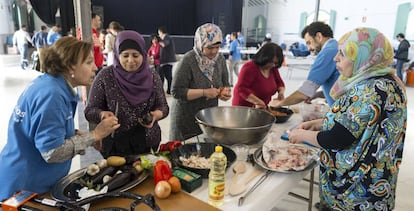Syrian refugees in Spain left in limbo
Without help integrating and learning language skills, new settlers face exclusion


After escaping their war-torn country and making their way over land and sea, the 50 or so Syrian families now settled in Spain face further obstacles to starting a new life, not the least of which is not speaking Spanish.
“Learning Spanish is the biggest obstacle they face right now,” says Enrique Álvarez, head of the Integrated Sports Foundation, an NGO that offers support to refugees who have been resettled in Madrid.
Getting a handle on the host language is the key to finding work and integrating into the local community, Álvarez explains. Without it, he says, there is a risk refugees will be ghettoized.
In a gesture aimed at encouraging integration, a volunteer association set up by savings bank La Caixa organized a family event last Sunday, which brought together around 250 people in the capital for a gastronomic and cultural exchange. While Spanish and Syrian children played outside, the adults produced a spread of paellas and traditional Syrian dishes that they all sat down together to enjoy.
Most of the Syrian refugees in Spain fled the civil war when it began in 2011, arriving well ahead of the current refugee crisis
Most of the Syrian refugees in Spain fled the civil war when it began in 2011, arriving well ahead of the current refugee crisis. Among them is Wafaa, a 26-year-old from Damascus with a degree in engineering and who now has a reasonable level of Spanish after taking lessons paid for by her family. “The state has never given me any help with Spanish classes,” she says.
Wafaa has enough Spanish to get by but she is in the minority. Most of her compatriots still have difficulty communicating even after five years. They are more likely to speak English than Spanish, but came to Spain either because they had relatives here or they believed they would then be able to move on to northern Europe.
Only a few of the refugees are recent arrivals. Rayan, 36, from the Tartus coast, arrived in December. He paid €1,000 for a fake Spanish passport which allowed him to cross into the Spanish exclave of Melilla from Morocco. He paid €2,500 for his wife and son to be smuggled in by car: she hid under the back seat and the five-year-old, who was given tranquilizers, was tucked under the passenger seat.
Few refugees find work when they leave these centers, even though many of them are doctors, chemists or lawyers
The family now lives in a refugee center in the Madrid suburb of Alcobendas, and where they can stay until the end of the year. They are given food and shelter, but say the regime is strict: “It’s like a jail.”
When their year is up, they will be left to fend for themselves and the prospects are not encouraging. Álvarez says few refugees find work when they leave these centers, even though many of them are doctors, chemists or lawyers.
Six months ago, Spain promised to take almost 16,000 refugees from Italy and Greece before the end of the year. Since then just 18 have arrived. The Spanish Interior Ministry has just announced the imminent arrival of another 87, but Álvarez believes little has been organized.
In any case, it’s not just about offering refugees a safe haven. “The problems start after they arrive,” Álvarez says. “How can we have 16,000 people leaving a refugee center after a year with no jobs to go to?”
Sign up for our newsletter
EL PAÍS English Edition is launching a weekly newsletter. Sign up today to receive a selection of our best stories in your inbox every Saturday morning. For full details about how to subscribe, click here.
English version by Heather Galloway.
Tu suscripción se está usando en otro dispositivo
¿Quieres añadir otro usuario a tu suscripción?
Si continúas leyendo en este dispositivo, no se podrá leer en el otro.
FlechaTu suscripción se está usando en otro dispositivo y solo puedes acceder a EL PAÍS desde un dispositivo a la vez.
Si quieres compartir tu cuenta, cambia tu suscripción a la modalidad Premium, así podrás añadir otro usuario. Cada uno accederá con su propia cuenta de email, lo que os permitirá personalizar vuestra experiencia en EL PAÍS.
¿Tienes una suscripción de empresa? Accede aquí para contratar más cuentas.
En el caso de no saber quién está usando tu cuenta, te recomendamos cambiar tu contraseña aquí.
Si decides continuar compartiendo tu cuenta, este mensaje se mostrará en tu dispositivo y en el de la otra persona que está usando tu cuenta de forma indefinida, afectando a tu experiencia de lectura. Puedes consultar aquí los términos y condiciones de la suscripción digital.








































